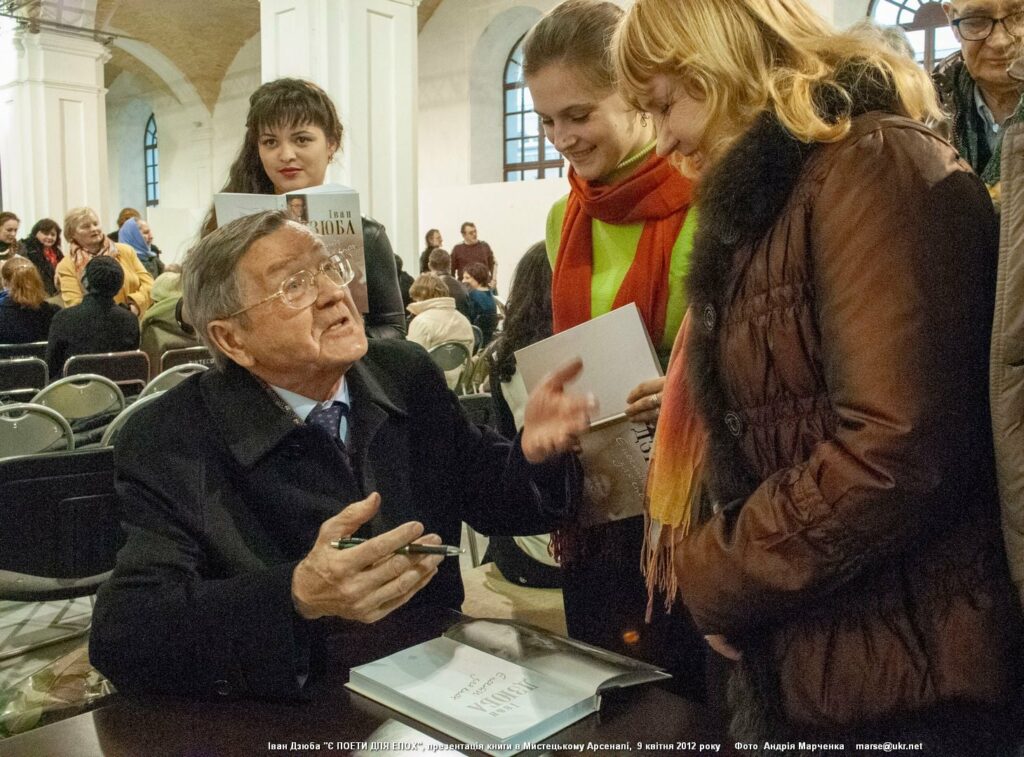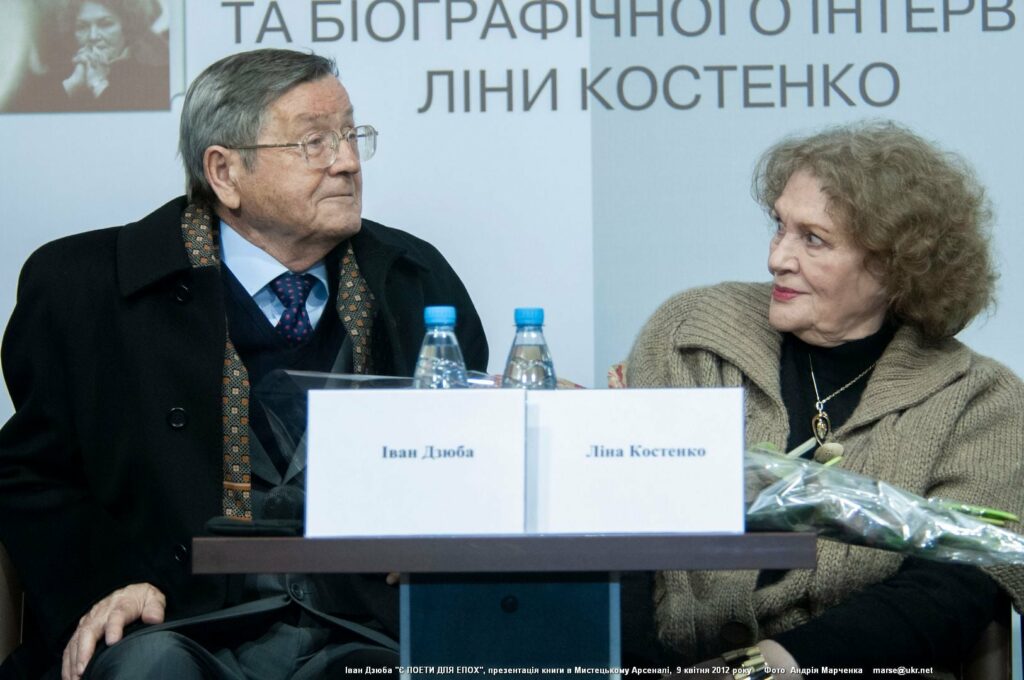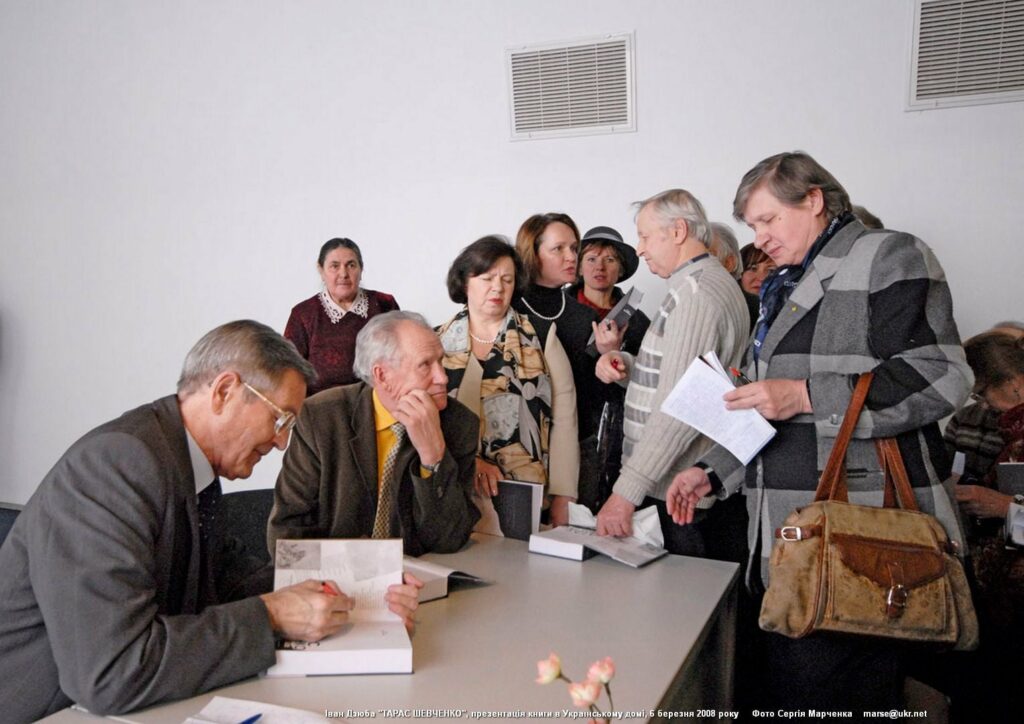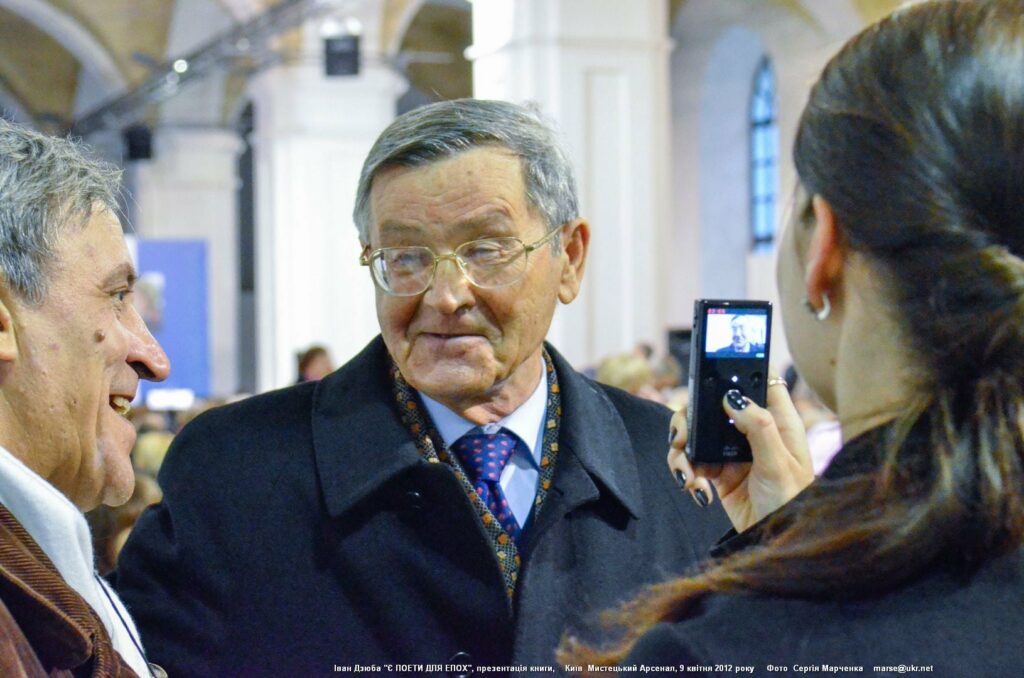Ivan Mykhailovych Dziuba, Hero of Ukraine, Academician of the National Academy of Sciences of Ukraine, literary critic, public figure and statesman, representative of the glorious cohort of the “sixties”, celebrates his 90th birthday
I am often asked how it happened that I grew up in the Donetsk region, in the supposedly “Russian-speaking” region, but kept the Ukrainian language, and even was awarded the title of the “Ukrainian bourgeois nationalist”. Well, firstly, it is a myth that Donetsk region is a Russian-speaking region. At least before the war and in the first postwar years, only large cities were Russian-speaking there, as elsewhere. (Khrushchov’s school reform changed everything.) But, all in all, this is not the point. I myself have often wondered: when did Ukraine “wake up” in me and thanks to what did it “wake up”? Here we all lived, it seems, under the same circumstances, we were brought up in the same way, we read the same books, we grew up in the same environment: we lived the same life, but for some, Ukraine means a lot, to others it does not care, only a territorial definition. Still others, for example, feel some involvement in Ukraine, but do not take it to heart. So: where does the feeling of Ukraine as a personal destiny come from? After all, no one brought us up intentionally, no one threw thoughts about Ukraine into our souls, on the contrary, everything was done so that we would live thoughtlessly and not see this problem. But the time comes – and it echoes in you.”
Ivan DZIUBA, from the book “Not a particular life”, Kyiv, Lybid Publishing House, 2013.

“Ivan Dziuba has been writing on Ukrainian language topics for almost half a century. And he writes because in the 19th, 20th, and the beginning of the 21st century the national elite, Ukrainian social and political forces made the greatest efforts to defend the native language, to ensure its full-blooded life in the society. The drama of this struggle lies not only in the fact that Ukrainians had to win over the right to use their native language from the colonizers, but in the fact that now, with independence, this right has not been won, that at the beginning of the 21st century Ukraine does not get rid of Russian, first of all, information – linguistic oppression. Ivan Dziuba painfully speaks about the historical absurdity of this situation: in his native house, as if free, in which Ukrainians rule (as if!), the native language is alien, humiliated, debased. It is dramatical and paradoxical, but both in previous centuries and at the beginning of the 21st century, “the last bastion of Ukrainism became the native language…”.
Mykola ZHULYNSKY, afterword to the book “Not a particular life”
Under Dziuba, the Ministry was not a “central philharmonic”
From the standpoint of the “man of the eighties”
Ivan Mykhailovych Dziuba is an iconic figure of the Ukrainian “sixties”. As to me, I belong to the generation of the “eighties”, so the conversations of seniors in whispers about persecutions and arrests in the early 1970s are a terrible but childhood memory for me. That is why I became acquainted with the treatise “Internationalism or Russification” and its author during the “perestroika” period. I literally “swallowed” the book in a “pocket” “prologue” edition, donated by my Ukrainian friends from Warsaw, in a couple of hours, sitting on a bench in the famous Saxon Garden (and then took it home, hidden at the bottom of a suitcase among other “subversive” literature, under articles on physics and underwear – in April 1988 the security bodies could still seriously scold for reading such books, but probably would not have put in jail). And I personally met Ivan Dziuba at one of the then “association” gatherings, where we spoke about the “white” (and to be honest – about the bloody) spots in our culture.
Ivan Dziuba’s article “Do We See the National Culture as an Integrity?”, his publications in defense of the Ukrainian language, research on Shevchenko and Slavophiles immediately appeared to be at the forefront of intellectual pursuits at that time when we were forced to make up for the losses of many decades. And Ivan Dziuba himself, reading just everything that was published at the time, noticed the publications of the young physicist Maksym Strikha, devoted to the problem of the Ukrainian language in natural and exact sciences (from which it was almost completely forced out – in those days by Russian language, not English).
Having already become the Minister of Culture of independent Ukraine in 1992, Ivan Dziuba did not disperse the old officeholders, but instead decided to invite advisers with a fresh, unconventional eye, who were to bring “fresh blood” to this traditionally “central philharmonic of the UkrSSR”. Thus, a young cyberneticist (and at the same time a brilliant poet and literary critic) Oleksandr Hrytsenko, ex-champion of Ukraine in ultra-lightweight boxing (and at the same time an incomparable philophonist and classical music adept, son of the legendary translator and GULAG prisoner Hryhoriy Kochur) Andriy Kochur, and the author of these lines came to the Ministry.
Despite all the difficulties (and a basic lack of experience), we still managed something. Andriy Kochur, collaborating with the American conductor of Ukrainian origin Ted Kuchar, managed to acquaint the world with Lyatoshynsky’s symphonies for the first time ever. Oleksandr Hrytsenko and I wrote the first (and incredibly audacious as at that time) Concept of Cultural Policy of Ukraine at the instruction of Ivan Dziuba. And Minister Dziuba himself did everything to make the Ministry cease to be a “central philharmonic”, instead becoming a body for the development and implementation of policy in the field of culture (previously there was no need because it was the Central Committee that designed policy, and others only relayed it at various levels ).

In the same way, Ivan Dziuba did everything in his power to acquaint the world with the cultural heritage of Ukraine. I have interesting personal memories from our joint trip to Denmark for the opening of the exhibition of our historical treasures. Minister Dziuba spoke good German, but then he needed an English translator, and I played that role. I remember, during one of our conversations with Danish colleagues he started remembering his prison past. The prisoners were given only “Soviet” books, including those about revolutionaries kept in tsarist prisons. But the old experience of “knocking” between neighboring cells could not be applied: in the KGB prison, between the two thick walls of the cells, there was also a one-meter gap, which made any contact between prisoners impossible. Obviously, this fact must also be kept in mind to understand: Dziuba, who had tuberculosis in the lungs, was then doomed to death by the system.
And then, sitting in a Danish restaurant with its rich dishes, Ivan Dziuba suddenly began to enthusiastically tell to me about ripe Donetsk steppe tomatoes, tastier, in his opinion, than everything that was served to us. He carried this love for his native Donetsk region to this day, and that is why it hurts him a lot that his “small homeland” Dokuchaievsk is now occupied.
Leonid Kuchma’s victory over Leonid Kravchuk in summer 1994 also meant the dismissal of Ivan Dziuba from the post of Minister. And although his team, led by the First Deputy, talented artist and “Rukh” Chairman of the Ivano-Frankivsk regional council Mykola Yakovyna, fought desperately for another year, the winners finally decided on the candidacy of a new Minister, and the Ministry became the “central philharmonic” again (the prerogative of policy-making shifted again to Bankova Street, though no longer to the Central Committee, but to the Presidential Administration, headed by Dmytro Tabachnyk).

But even after his resignation, Ivan Dziuba did not leave the public arena. From 1992 he headed the magazine “Suchasnist” (“Modern Times”), which was transferred to Ukraine (which was probably our best literary magazine of all time), and I was very happy to publish my articles, translations and poems there. At the same time, having received the status of an Academician and Head of the Academic Department of language and literature (although he even did not defend his Ph.D. due to the circumstances of the time), Ivan Dziuba achieved a radical rise in Ukrainian humanities which was humiliated for decades-long. He proved to be a prudent and fair leader of the Shevchenko Prize Committee. He took an active part in the “First of December” public initiative. He initiated a unique project “Encyclopedia of Modern Ukraine”, and in the midst of “zero years” in the newly created Institute of Encyclopedic Research of the National Academy of Sciences he substantiated the need to publish the “Great Ukrainian Encyclopedia” (occasionally involving me in this concept).
It was a great honor for me to receive an invitation from Ivan Dziuba to write a preface to his book about his scientific teacher, Academician Oleksandr Biletskyi. It is to appear by the 90th anniversary of Ivan Dziuba, the great Ukrainian thinker of the 20th century. This book proves once again: referring to the events of the past decades, Academician Dziuba invariably does so with a projection for the present day. And if Ukraine and Ukrainian culture, despite further threats, have a chance for a decent future – then this is a great personal merit of Ivan Mykhailovych Dziuba.
Maksym STRIKHA,
Doctor of physical and mathematical sciences, Professor, Adviser to the Minister of Culture of Ukraine Ivan Dziuba in 1993-94.
“Knight of Literary Science”
This is the most exhaustive study to date dedicated to the personality, legacy and scientific views of the prominent Ukrainian literature scholar Oleksandr Biletskyi; it was written in 1967–1969, when its author, Ivan Dziuba, a literature scholar and member of the Association of Writers of Ukraine, first worked as a literary proofreader at the “Ukrainian Biochemistry Magazine”, and then managed to get a job for a while “in his degree field”, receiving the position of editorial employee at the “Dnipro” publishing house.
The diary notes of the then party leader of Ukraine Petro Shelest give an idea of the conditions in which Ivan Dziuba worked and lived: “On my assignment, Dmyterko, Korotych, and Podoliak wrote a good article against Dziuba’s concept. I read a letter signed by P (…) and Dmyterko, where they debunked Dziuba, they wrote well, just well done” (July 21, 1969). “I saw Nikitchenko (KGB) … Nikitchenko is surprised and he suspects that someone from the KGB informs Dziuba about everything, because all the measures taken become known. These are very bad and dangerous things” (October 21, 1969).

This was not written by some cave Ukrainophobic Neandrathal (who was not lacking either then or later), but by Petro Shelest, who was generally committed to the Ukrainian language and historical memory.
However, Ivan Dziuba wrote his fundamental work “Internationalism or Russification” against the denationalization of Ukraine in 1965 (and Vasyl Makukh burned himself alive three years later on Khreshchatyk, protesting against the same denationalization), exactly in Shelest’s days. The 1970s are coming soon: the gloomy decade of Shcherbytskyi (this new party leader – “technocrat” didn’t speak Ukrainian as a matter of principle, even with writers), Malanchuk (the CPU ideologue, “famous” for fighting the national intellectuals), and Fedorchuk (head of the KGB of the UkrSSR persecuted not only real but also potential dissidents, with special sadism). Against this background, the times of Shelest will seem just liberal. And this once again emphasizes the incredible tragedy of the “Ukrainian twentieth century”, many plots of which will seem frankly macabre from the standpoint of representatives of more prosperous cultures…”
From the preface to the book, by Maksym STRIKHA
